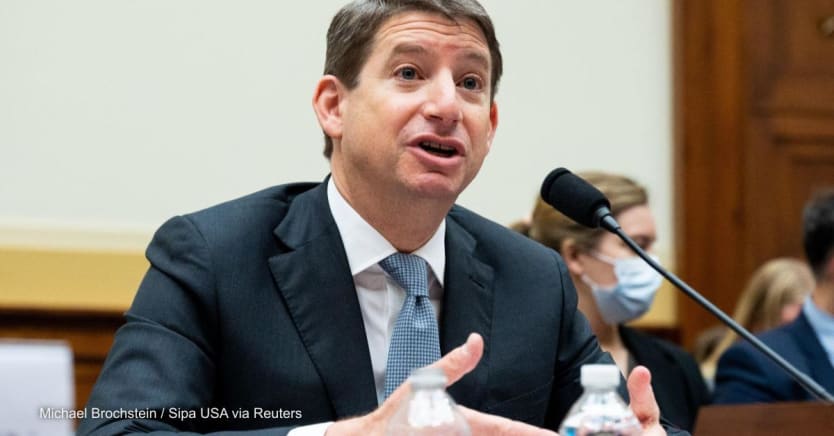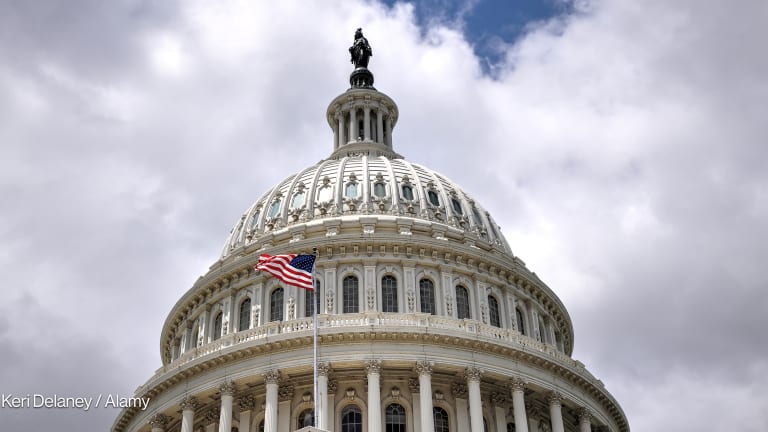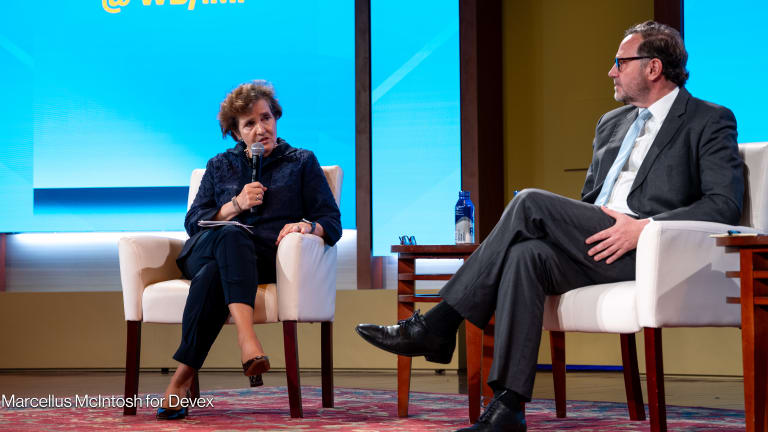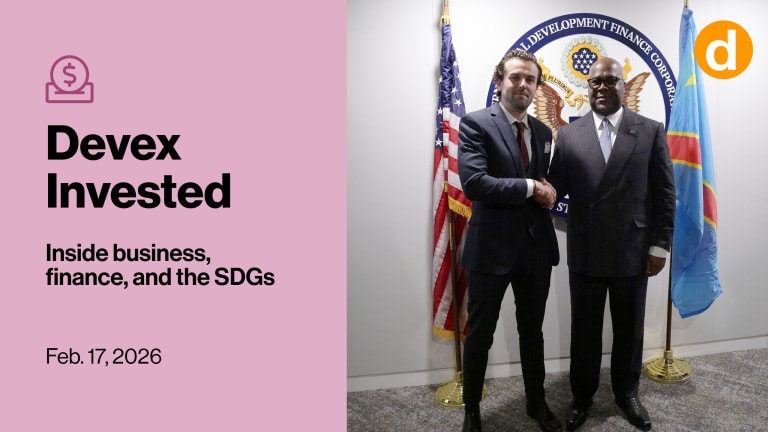
Leaders of several of the smaller U.S. development agencies had a chance to be grilled by lawmakers at a House Foreign Affairs Committee hearing on Tuesday.
The CEOs of the Millennium Challenge Corporation, the U.S. International Development Finance Corporation, and Peace Corps all testified; one of the first times since they took up their posts.
The wide-ranging hearing focused on efforts to counter China, changes at MCC and a relaunch of the Peace Corps for the first time since the COVID-19 pandemic began.
Here’s what you need to know:
DFC
Is DFC focused on countering China? Is its development mandate its priority? Does it only support green energy? DFC CEO Scott Nathan received all those questions and more, pushing him to define the priorities of an agency that has been buffered by competing priorities since its creation in 2019.
DFC was created to advance U.S. strategic interests and pursue highly developmental transactions in the world’s lowest-income countries and “I see those two mandates, two missions as totally complementary because good development is good foreign policy,” Nathan said at the hearing.
On China: When asked, Nathan said competing with China is an important part of the agency’s thinking, policy, and planning.
DFC is focused on finding investment opportunities in the Indopacific region – and last year it made more investments in India than any other country – but often faces two challenges: countries not meeting the agency’s income requirements and companies having Chinese ties, Nathan said.
One soon-to-be-finalized project that exemplifies DFC’s efforts is a telecommunications deal in six South Pacific countries to upgrade cellular digital networks using open, safe, and secure technologies. They would not be provided by Chinese companies, he said. There are also large infrastructure projects in the pipeline in Africa, including a toll road that may be announced soon that could provide an alternative to Chinese financing, Nathan said.
On equity investments: Nathan received several questions about DFC’s equity authority, which as Devex has reported, has been hampered by the way it is scored for budgeting purposes. The way the government has chosen to score it requires all equity investments to be treated like grants, rather than being treated similarly to loans. At the moment the agency’s ability to do equity investments is “severely constrained” and he is “very much looking forward to a potential solution,” Nathan said.
Congress is considering a change in scoring as part of legislation focused on economic competition with China that is currently going through a process to try to reconcile Senate and House versions. There seemed to be bipartisan support for the equity scoring fix at the hearing, and Nathan said he has had extensive conversations with the White House Office of Management and Budget, which doesn’t oppose the language in the legislation. The change could allow DFC to invest billions of dollars in equity investments, up from what today is only several $100 million.
Energy investments: Another hot topic was DFC’s energy investments in Europe and Eurasia. The agency was given authority in 2019 to invest in energy projects in those regions regardless of the income status of the countries. It expects to announce a significant commitment to the Three Seas Initiative Investment Fund, which will focus on energy infrastructure in the region, at a summit next week, Nathan said. DFC is also looking at potential natural gas investments in Bulgaria, the Baltic countries, and in Greece, and may support small nuclear energy projects in Romania, among other countries.
Nathan indicated that DFC would continue to pursue natural gas projects with a strong development impact, similar to a $217 million investment last year that supported an 83 megawatt power plant in Sierra Leone.
“While addressing climate is a critical part of our strategy, providing energy for development is also a part of the strategy. The two things go hand in hand,” he said.
Accountability: Some lawmakers also expressed concerns that the agency not stray from its development mandate, particularly as it invests in energy in high income countries, and pushed for strong accountability and transparency.
The agency is looking to boost staff numbers – both for sourcing and monitoring investments, Nathan said. DFC requested about $220 million for administrative expenses in fiscal year 2023, which will allow it to expand its staff to about 700 people – up from about 400 in 2021.
MCC
The Millennium Challenge Corporation has asked Congress to consider legislative changes to give it more flexibility, including removing a funding cap on its investments in lower middle income countries and potentially changing the criteria used to determine which countries can be considered for the agency’s investments, CEO Alice Albright said on Tuesday.
MCC can only invest in those countries the World Bank considers low- and lower-middle income countries and is considering expanding the pool of eligible countries to about 125 which represent 90% of global poverty challenges. The move would require a change in legislation and likely additional funding down the line, Albright said.
The request comes as MCC has paused several compacts — the agency’s 5-year grant agreements — due to democratic backsliding in several countries including in Burkina Faso and Tunisia.
Burkina Faso had been expected to have an individual compact and be part of a regional compact — one of the agency’s first — focused on energy generation in West Africa but was removed. The agency’s first two regional compacts, both in West Africa, are expected to go forward this year, she said.
MCC is also facing “increasing amounts of mis- and disinformation in many countries where we are working or seek to work,” Albright said.
Those campaigns led to a potential compact in Sri Lanka falling apart and a controversial drawn-out process to get a deal finalized in Nepal earlier this year. Among false claims was that MCC would build army bases and that accepting the compact would mean joining a U.S. military alliance, Albright said, adding that she hoped the agency would be removed from pending legislation that could be seen to link MCC to the U.S. military and its objectives to counter China.
Peace Corps
The Peace Corps is starting to return members to countries around the world for the first time since it abruptly brought them all back to the U.S. at the start of the COVID-19 pandemic.
The world they return to and the agency they serve has changed, Peace Corps CEO Carol Spahn told lawmakers.
“What we’ve learned in a nutshell is that just like our volunteers, we need to be flexible and ready to adapt,” she said.
The agency has developed a robust reentry protocol, implemented a new security incident management system, has a new project framework for training, new pandemic protocols, and new security, mental health, and sexual assault prevention programs and services. It also made internal reforms to promote diversity, equity, and inclusion and in the past two years has gone to 41% from about 6% of senior staff that identify as Black, Indigenous, and people of color, Spahn said.
It is unclear exactly how the pandemic, and the withdrawal of volunteers for about two years, will impact recruitment for volunteers, but the agency is organizing focus groups and market research to ensure it has a strong pipeline, she said.
Search for articles
Most Read
- 1
- 2
- 3
- 4
- 5








